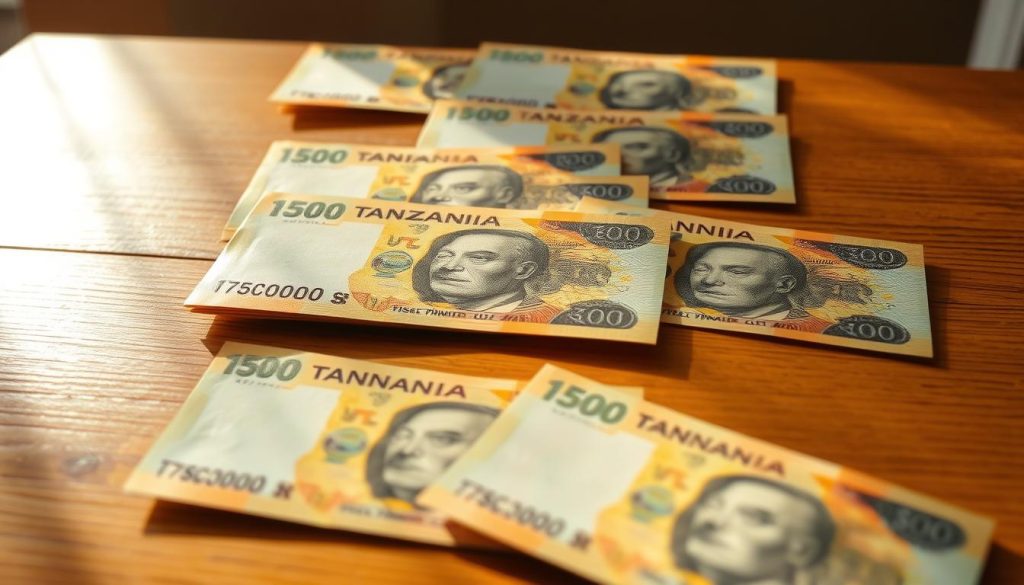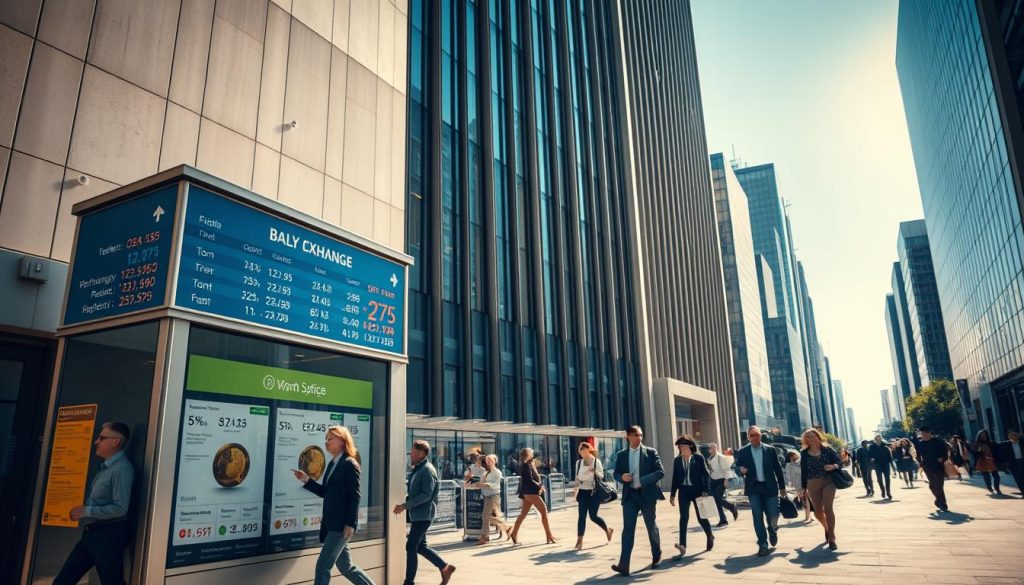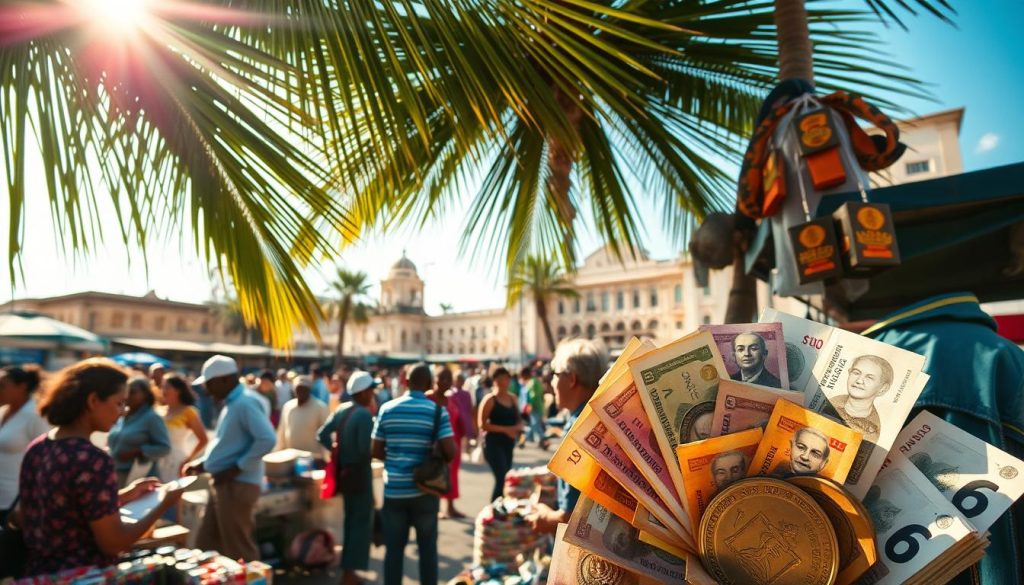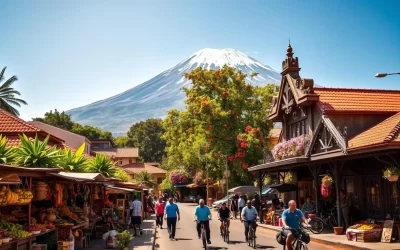Did you know that the official currency of Tanzania, the Tanzanian Shilling, has an exchange rate of about 2,500 shillings to one U.S. dollar? This makes it essential to understand how to manage your money when visiting this vibrant country.
This guide is designed to help you navigate the local currency and payment systems with ease. Whether you’re exchanging dollars, using ATMs, or budgeting for your trip, we’ve got you covered.
From recognizing banknotes to tips on digital payments, this guide ensures you’re prepared every step of the way. Let’s make your travel experience seamless and stress-free!
Introduction to Tanzania Travel and Currency Essentials
Handling money wisely ensures a stress-free journey abroad. Whether you’re exploring bustling cities or remote villages, understanding the local currency is crucial. It helps you navigate daily transactions, avoid scams, and make the most of your trip.
In many places, cash remains king, especially in rural areas where cards might not be accepted. Banknotes and coins are essential for small purchases, tipping, and local markets. Knowing how to manage your money saves time and ensures you’re always prepared.
Why Understanding Currency Matters for Your Journey
Mastering the local currency system is more than just convenience—it’s a way to respect the culture and economy of the country you’re visiting. It also helps you avoid overpaying or falling victim to unfavorable exchange rates.
Exchanging money abroad can come with challenges. Rates vary, and some providers charge high fees. Planning ahead ensures you get the best rate and avoid unnecessary expenses.
An Overview of the Economy and Travel Landscape
The local economy often relies heavily on tourism, making it essential for visitors to understand the financial landscape. The shilling is the primary currency, and banknotes come in various denominations for everyday use.
Time management is key when planning your finances. Knowing where and when to exchange money can make a big difference. This guide will help you navigate these essentials, ensuring a seamless and enjoyable travel experience.
Understanding Tanzania: Ultimate Travelers Guide to Currencies & Payments
Navigating the financial landscape of a new country can be both exciting and challenging. In Tanzania, the currency system plays a vital role in daily life, especially for travelers. Knowing how to manage your money ensures a smooth and enjoyable trip.
The Tanzanian Shilling (TZS) is the official currency, and it’s essential to understand its value and usage. Banknotes come in denominations like 500, 1,000, 5,000, and 10,000 TZS, while coins are less commonly used. Foreign currencies like the US dollar are accepted in some places, but local cash is king for most transactions.
Everyday transactions often require cash, especially in rural areas where cards might not be accepted. Markets, small shops, and transportation services typically prefer shillings. For larger purchases or tourist spots, credit and debit cards are more widely accepted, though fees may apply.
Understanding the local economy is crucial. Tanzania’s financial system is shaped by its reliance on tourism and agriculture. This means travelers should plan their exchange strategies carefully to avoid unfavorable rates or high fees. ATMs are available in major cities, but they dispense only shillings, so plan accordingly.
Here’s a quick overview of common costs in Tanzania:
| Item | Cost (TZS) |
|---|---|
| 1.5-liter bottle of water | 1,000 |
| 0.5-liter bottle of local beer | 2,500 |
| Lunch in a good café | 40,000+ |
| Quick snack in a local café | 10,000 |
Converting money can be tricky, so it’s wise to research exchange rates and fees beforehand. Many travelers find it helpful to carry a mix of cash and cards for flexibility. In the next sections, we’ll dive deeper into using US dollars, accessing ATMs, and managing fees to make your travel experience seamless.
Local Currency Breakdown: The Tanzanian Shilling
The Tanzanian Shilling is more than just money—it’s a gateway to local culture. Understanding its design, security features, and practical use ensures a seamless experience during your travels. Let’s dive into the details of this vibrant currency.

Banknotes and Coins: Denominations and Features
The Tanzanian Shilling comes in various denominations, each with unique designs and security features. Banknotes include 500, 1,000, 2,000, 5,000, and 10,000 shillings, while coins are available in 50, 100, 200, and 500 shillings. These denominations cater to everyday transactions, from small purchases to larger expenses.
Security is a priority for the Bank of Tanzania, which issues the currency. Banknotes feature watermarks, holograms, and microprinting to prevent counterfeiting. These elements make it easier to identify genuine banknotes and protect your cash.
In rural areas, smaller denominations like 500 and 1,000 shillings are especially useful. Coins are less common but still accepted for minor purchases. Carrying a mix of banknotes and coins ensures you’re prepared for any transaction.
Practical Use in Everyday Transactions
The Tanzanian Shilling is the backbone of the local economy. Whether you’re shopping at a market, paying for transportation, or dining at a café, this currency is widely accepted. In major cities, credit and debit cards are also an option, but cash remains essential for smaller vendors.
Understanding the currency system helps you navigate daily life with ease. It also shows respect for the local culture and economy. By familiarizing yourself with the shilling, you’ll avoid overpaying and ensure a hassle-free journey.
Here’s a quick tip: Always check your banknotes for security features like watermarks and holograms. This simple step helps you avoid counterfeit money and protects your finances.
Using US Dollars and How to Exchange Currency
Exchanging money abroad can be a breeze with the right knowledge. When visiting a new country, understanding how to use US dollars and convert them into the local currency is essential. This ensures you’re prepared for daily expenses and avoid unnecessary fees.
Safe Exchange Practices at Banks and Forex Bureaus
To get the best exchange rate, always use authorized banks or forex bureaus. These institutions offer competitive rates and ensure your money is safe. Avoid street vendors or unofficial exchanges, as they may provide counterfeit bills or unfavorable rates.
Here are some tips for a smooth exchange:
- Check the rate before exchanging to ensure you’re getting a fair deal.
- Bring crisp, undamaged US dollars, as torn or outdated bills may be rejected.
- Keep your receipt in case you need to exchange leftover shillings before leaving.
Tips for Using US Dollars in Tourist Areas
In tourist hotspots, US dollars are often accepted for accommodations, tours, and larger purchases. However, smaller vendors and local markets prefer the local currency. Carry a mix of cash and cards for flexibility.
Here’s how to make the most of your dollars:
- Use dollars for big-ticket items to avoid multiple exchange transactions.
- Always ask if prices are quoted in dollars or shillings to avoid confusion.
- Compare rates at different establishments to ensure you’re not overpaying.
By following these tips, you’ll navigate the currency system with ease and make the most of your travel budget.
Accessing Money on the Go: ATMs, Banks, and Cards
Managing your finances while traveling can make or break your experience. In major cities like Dar es Salaam and Arusha, accessing cash is straightforward if you know where to look. ATMs are widely available, but it’s essential to choose reliable locations to avoid issues.
Finding Reliable ATMs in Major Cities
ATMs are your go-to method for withdrawing local currency. In urban centers, you’ll find them at banks, shopping malls, and airports. Stick to ATMs operated by trusted banks to minimize risks like skimming or transaction errors.
Here are some tips for using ATMs abroad:
- Check for security features like cameras and well-lit areas.
- Withdraw larger amounts to reduce frequent service fees.
- Always have a backup card in case of issues.
Navigating Credit and Debit Card Usage
Using cards is convenient, especially for larger purchases. Most hotels, restaurants, and tourist spots accept credit and debit cards. However, smaller vendors and rural areas may prefer cash, so it’s wise to carry both.
Keep these points in mind:
- Inform your bank of your travel plans to avoid card blocks.
- Be aware of foreign transaction fees, which can add up quickly.
- Carry multiple cards from different networks for flexibility.
By combining cash and cards, you’ll have the flexibility to handle any situation. This ensures a smooth and enjoyable travel experience.
Understanding Conversion Rates and Managing Fees
Currency exchange doesn’t have to be complicated if you know what to look for. Understanding conversion rates and managing fees can save you money and make your travel experience smoother. Let’s break down the essentials to help you navigate this process with confidence.

What Are Conversion Rates and Why Do They Matter?
A conversion rate is the value of one currency compared to another. For example, as of now, 1 US dollar equals about 2,500 Tanzanian shillings. Knowing this helps you budget effectively and avoid overpaying during your trip.
Rates fluctuate based on market conditions, so it’s wise to check them regularly. A small difference in the rate can significantly impact how much money you receive during an exchange.
How Fees Are Managed During Currency Exchange
Fees are an unavoidable part of currency exchange, but they can be minimized. Banks and forex bureaus often charge a small percentage or flat fee for their services. Always ask about fees upfront to avoid surprises.
Here’s how to manage fees effectively:
- Compare rates and fees at multiple providers before exchanging.
- Use authorized banks or forex bureaus for better rates and security.
- Avoid unofficial exchanges, as they may charge hidden fees or provide counterfeit bills.
Tips for Spotting the Best Exchange Rates
Getting the best exchange rate requires a bit of research. Start by checking rates online or using apps that provide real-time updates. Look for providers with transparent fee structures and positive reviews.
Here are some additional tips:
- Exchange larger amounts to reduce the impact of fees.
- Carry crisp, undamaged US dollars for better acceptance.
- Keep receipts in case you need to exchange leftover shillings later.
Common Pitfalls and How to Avoid Them
Exchanging money abroad can come with challenges. Some providers offer unfavorable rates or charge high fees. Others may try to pass off counterfeit bills. Stay vigilant to protect your finances.
Here’s how to avoid common mistakes:
- Always verify the rate before proceeding with an exchange.
- Check banknotes for security features like watermarks and holograms.
- Compare rates between providers to ensure you’re getting a fair deal.
By understanding conversion rates and managing fees wisely, you can make the most of your travel budget. Whether you’re exchanging dollars or using shillings, these tips will help you navigate the process with ease.
Tipping Etiquette and Bargaining Techniques
Understanding local customs around tipping and bargaining can greatly enhance your travel experience. These practices are more than just financial transactions—they’re opportunities to connect with the culture and show respect for local traditions. Whether you’re dining at a restaurant or shopping in a bustling market, knowing the right approach ensures smooth interactions.
Culturally Appropriate Tipping at Restaurants and Hotels
Tipping is a significant part of the service industry in many countries. It’s a way to show appreciation for good service while supporting local workers. Here’s a quick guide to tipping in various scenarios:
- Restaurants: A tip of 10-15% is customary if service isn’t included in the bill.
- Hotels: For porters, $1 per bag is standard. For housekeeping, $2-5 per night is appreciated.
- Guides and Drivers: For tours, $10-20 per day is a generous tip.
Always carry small bills in the local currency for tipping. This ensures you’re prepared and avoids awkward situations.
How to Bargain Respectfully in Local Markets
Bargaining is a common practice in many markets, but it’s important to approach it with respect. Here are some tips to help you negotiate effectively:
- Start with a Smile: A friendly attitude goes a long way in building rapport.
- Know the Value: Research typical prices for items to avoid overpaying.
- Be Polite: If the seller declines your offer, thank them and move on.
Remember, bargaining is a cultural exchange, not a confrontation. It’s about finding a fair price while respecting the seller’s livelihood.
By mastering these practices, you’ll navigate local customs with confidence and make the most of your travels. Whether you’re leaving a tip or negotiating a price, these skills ensure positive interactions and memorable experiences.
Payment Methods: Cash Versus Card in Tanzania
Choosing the right payment method can make your travels smoother and more enjoyable. Whether you’re exploring bustling cities or remote villages, understanding the pros and cons of using cash versus cards is essential. This guide will help you decide which option works best for your needs.
Why Cash is King for Daily Transactions
In many areas, especially rural ones, cash remains the preferred payment method. Local markets, small shops, and transportation services often don’t accept cards. Carrying shillings ensures you’re prepared for everyday expenses like meals, souvenirs, and tips.
Here’s why cash is reliable:
- It’s widely accepted, even in remote locations.
- You avoid service fees or connectivity issues common with cards.
- It’s easier to budget when you can see your money physically.
However, carrying large amounts of cash can be risky. Always keep it secure and avoid displaying it in public.
When Cards Are the Better Choice
In urban areas, cards are more convenient for larger purchases. Hotels, restaurants, and tourist attractions often accept credit and debit cards. This reduces the need to carry large amounts of cash and provides a record of your spending.
Here’s where cards shine:
- They’re safer for high-value transactions.
- You can track expenses easily through bank statements.
- Some cards offer rewards or cashback on purchases.
Be aware of foreign transaction fees and inform your bank about your travel plans to avoid blocked cards.
Balancing Cash and Cards for Flexibility
The best approach is to carry a mix of both cash and cards. Use cash for small, everyday expenses and cards for larger purchases or emergencies. This ensures you’re prepared for any situation, whether you’re in a bustling city or a remote village.
Here’s how to manage both effectively:
- Withdraw cash from ATMs in major cities for better rates.
- Keep a backup card in case of loss or theft.
- Carry small denominations of shillings for tips and minor expenses.
By balancing these payment methods, you’ll enjoy a hassle-free and flexible travel experience.
Budgeting and Managing Your Money Throughout Your Trip
Planning your daily expenses can make your trip more enjoyable and stress-free. A well-organized budget ensures you have enough funds for everything from meals to activities while avoiding overspending. Here’s how to create a daily spend plan that works for you.
Strategies for Creating a Daily Spend Plan
Start by calculating your total money for the trip and dividing it by the number of days. This gives you a clear idea of how much you can spend daily. Allocate cash for essentials like food, transportation, and accommodations first.
Understanding exchange rates is crucial. Always confirm prices in the local currency to avoid confusion. Use apps like Wise to track rates and avoid hidden fees when converting money.
Here’s a step-by-step approach to budgeting:
- Track Spending: Use a notebook or app to record every purchase.
- Prioritize: Focus on experiences and activities that matter most to you.
- Reduce Waste: Cut back on unnecessary expenses like impulse buys.
Tools like Revolut or budgeting apps can help you manage your funds efficiently. They allow you to set daily limits and monitor your spending in real-time.
“A budget is telling your money where to go instead of wondering where it went.”
By sticking to your plan, you’ll avoid financial stress and make the most of your travel experience. Remember, flexibility is key—set aside a small portion of your budget for unexpected opportunities or emergencies.
Ensuring Safety When Handling Money Abroad
Keeping your finances secure while traveling is just as important as planning your itinerary. Whether you’re exploring bustling cities or remote areas, knowing how to protect your cash and valuables ensures a stress-free experience. Let’s dive into practical measures to safeguard your money and avoid common pitfalls.
Protecting Your Cash and Valuables
When traveling, it’s essential to keep your cash and valuables safe. Use hotel safes to store passports, extra money, and important documents. For daily use, consider a discreet money belt or hidden pouch to carry smaller amounts securely.
Here are some additional tips:
- Divide your money into multiple places to minimize loss if theft occurs.
- Avoid displaying large amounts of cash in public.
- Keep a backup card in a separate location for emergencies.
Avoiding Scams and Preventing Theft
Scams can happen anywhere, but being vigilant reduces the risk. Always verify currency and banknotes to avoid counterfeits. Check for watermarks, holograms, and other security features before accepting cash.
Here’s how to stay safe:
- Be cautious of strangers offering unsolicited help or deals.
- Use ATMs in well-lit, secure locations and shield your PIN during withdrawal.
- Keep emergency contacts handy, including local authorities and your embassy.
By following these tips, you’ll handle your finances with confidence and enjoy a worry-free journey. Remember, staying aware of your surroundings is key to ensuring your safety.
| Safety Tip | Action |
|---|---|
| Use Hotel Safes | Store passports and extra money securely. |
| Carry Discreetly | Use a money belt or hidden pouch for daily cash. |
| Verify Currency | Check banknotes for security features to avoid counterfeits. |
| Stay Vigilant | Be cautious in crowded areas and avoid displaying valuables. |
Local Customs and Cultural Etiquette for Travelers
Respecting local customs and cultural norms is key to a meaningful travel experience. Understanding how to dress, behave, and interact with locals ensures you show respect and avoid misunderstandings. This guide will help you navigate cultural expectations with ease.
How to Dress Modestly Outside Tourist Areas
In many areas, especially conservative ones, dressing modestly is essential. Avoid revealing clothing like shorts, tank tops, or low-cut tops. Instead, opt for long skirts, pants, and shirts with sleeves. This shows respect for local values and helps you blend in.
For women, covering your shoulders and knees is often expected. Men should avoid going shirtless, even in hot weather. By dressing appropriately, you’ll feel more comfortable and avoid unwanted attention.
Key Social Do’s and Don’ts
Understanding social norms is just as important as dressing right. Here are some do’s and don’ts to keep in mind:
- Do greet locals politely: A simple “hello” in the local language goes a long way.
- Don’t point with your finger: Use your whole hand or nod instead.
- Do ask for permission before taking photos: Some people may not want their picture taken.
- Don’t show public displays of affection: This can be considered disrespectful in many places.
When visiting a market, bargaining is common, but always do so respectfully. Start with a smile and negotiate politely. Remember, the goal is to reach a fair price, not to win an argument.
Tipping is another important aspect of cultural etiquette. While it’s not always expected, it’s appreciated for good service. Here’s a quick guide:
| Service | Suggested Tip |
|---|---|
| Restaurant Staff | 10% of the bill if service isn’t included |
| Guides | $10–$15 per day |
| Drivers | $5–$8 per day |
By following these tips, you’ll show respect for local customs and create positive interactions. Whether you’re exploring a bustling city or a quiet village, these practices will enhance your travel experience.
Legal Considerations: Navigating Local Laws and Penalties
Being aware of local laws and regulations is crucial for a smooth travel experience. Understanding the rules around photography, public behavior, and currency handling can help you avoid unintentional missteps and serious penalties. This section will guide you through key legal considerations to keep in mind during your trip.

Understanding Restrictions on Photography and Public Behavior
Photography is a common activity for travelers, but it’s important to know where and when it’s allowed. In many places, taking photos of government buildings, military installations, or even local people without permission can lead to fines or confiscation of your equipment. Always ask for consent before photographing individuals or private property.
Public behavior is another area where cultural norms and laws intersect. Actions like public intoxication, littering, or inappropriate dress can be considered disrespectful and may result in penalties. Familiarize yourself with local customs to ensure your actions align with societal expectations.
What You Need to Know About Currency Regulations
Handling currency abroad comes with its own set of rules. For example, carrying large amounts of cash may require declaration at customs. In some countries, exporting or importing local banknotes is restricted. Always check the regulations of your destination to avoid legal issues.
Using cards or digital payments can simplify transactions, but be aware of potential fees or restrictions. Some places may have limits on exchange amounts or require specific documentation for large transactions. Researching these details beforehand can save you from unexpected complications.
“Ignorance of the law is no excuse. Taking the time to understand local regulations ensures a safer and more enjoyable journey.”
Here’s a quick overview of actions that could lead to legal trouble:
| Action | Potential Penalty |
|---|---|
| Photographing restricted areas | Fines or equipment confiscation |
| Public intoxication | Arrest or fines |
| Carrying undeclared cash | Confiscation or legal action |
| Exporting local currency | Fines or penalties |
If you find yourself in a legal emergency, contact local authorities or seek assistance from your embassy. Familiarizing yourself with country-specific legal requirements is the best way to ensure a hassle-free trip.
Arrival Tips: Navigating Airport Currency Procedures
Stepping off the plane in a new country can be overwhelming, but managing your money right from the start sets the tone for a smooth trip. Knowing how to handle currency exchange and access cash efficiently ensures you’re prepared for immediate expenses like transportation or meals.
Using Airport Exchange Services Wisely
Airports often have currency exchange counters, but not all services offer the best rate. Compare rates between providers before making a transaction. Look for authorized banks or forex bureaus within the airport to ensure safety and reliability.
Here’s how to make the most of airport exchanges:
- Bring crisp, undamaged US dollars for better acceptance.
- Check the rate and fees before exchanging to avoid hidden costs.
- Keep your receipt in case you need to exchange leftover cash later.
Accessing Cash Quickly and Safely
Use ATMs located in secure areas of the airport to withdraw local currency. Stick to machines operated by trusted banks to minimize risks like skimming. Withdraw larger amounts to reduce frequent service fees, but avoid carrying excessive cash for safety reasons.
Here’s a quick guide to locating reliable ATMs:
| Airport | ATM Locations |
|---|---|
| Dar es Salaam | Near arrivals hall, operated by banks like CRDB and NMB |
| Kilimanjaro | Adjacent to baggage claim, operated by Barclays and Stanbic |
Minimizing Exposure to Scams
When arriving in a new city, stay vigilant to avoid scams. Verify currency and banknotes for security features like watermarks and holograms. Avoid unsolicited offers for exchange services, and always use authorized providers.
Here are some safety tips:
- Keep your cash and valuables secure in a money belt or hidden pouch.
- Be cautious in crowded areas, especially around ATMs or exchange counters.
- Have emergency contacts handy, including local authorities and your embassy.
By following these tips, you’ll navigate airport currency procedures with ease and start your trip on the right foot. Whether you’re exchanging dollars or withdrawing shillings, these practices ensure a smooth and safe arrival.
Staying Connected: Wi-Fi, Mobile Banking, and Digital Payments
Staying connected while traveling is essential for managing your finances and ensuring a smooth experience. With the rise of mobile wallets and digital payment systems, handling money has never been easier. However, it’s important to know how to use these tools safely and efficiently.
How to Safely Use Online and Mobile Banking
Wi-Fi availability plays a key role in mobile banking abroad. Many hotels, cafes, and public spaces offer free Wi-Fi, but not all connections are secure. Always use a VPN to protect your data when accessing sensitive information like bank accounts or credit card details.
Here’s how to set up and use digital payment systems safely:
- Choose a reliable provider: Opt for well-known platforms like PayPal, Venmo, or local apps with strong security features.
- Enable two-factor authentication: This adds an extra layer of protection to your accounts.
- Monitor your transactions: Regularly check your bank statements for any unauthorized activity.
When comparing options for mobile and online financial transactions, consider factors like fees, exchange rates, and ease of use. Some platforms offer better rates for international transfers, while others may have lower fees for local transactions.
To protect your personal data and funds, follow these precautions:
- Avoid public Wi-Fi for banking: Use mobile data or a secure connection instead.
- Keep your devices updated: Install the latest security patches to prevent vulnerabilities.
- Use strong passwords: Combine letters, numbers, and symbols for added security.
Choosing the right method for digital payments depends on your needs. For example, QR payments are growing rapidly, with global spending expected to reach $3 trillion by 2025. This option is convenient for quick transactions, especially in markets and small shops.
Finally, make sure you understand the fees associated with online transactions. Some providers charge high exchange rates or hidden fees, which can add up quickly. Research your provider and compare rates to get the best deal.
By following these steps, you’ll stay connected and manage your money securely while traveling. Whether you’re using mobile banking or digital payments, these tips ensure a hassle-free experience.
Special Considerations for Zanzibar and Coastal Areas
Exploring Zanzibar and its coastal regions offers a unique financial landscape that differs from the mainland. While the Tanzanian shilling remains the official currency, you’ll notice subtle variations in payment methods and transactional practices. Understanding these differences ensures a smoother experience during your travels.

Currency Use and Payment Methods in Zanzibar
In Zanzibar, the Tanzanian shilling is widely used for most transactions. Smaller denominations like 500 and 1,000 shillings are particularly useful for local markets and transportation. While US dollars are occasionally accepted in tourist areas, relying on shillings is recommended for better flexibility.
Coins are less common but still used for minor purchases. Carrying a mix of cash and coins ensures you’re prepared for any situation. ATMs are available in Stone Town and other major areas, but they dispense only shillings. Plan your withdrawals accordingly to avoid unnecessary fees.
Planning for Transactions in Tourist Hotspots
Tourist hotspots like Nungwi and Kendwa often cater to international visitors, making US dollars more acceptable. However, smaller vendors and local markets prefer the local currency. Always confirm prices in shillings to avoid confusion or overpaying.
Here’s a quick guide to managing your finances in Zanzibar:
| Location | Preferred Payment Method |
|---|---|
| Local Markets | Cash (Tanzanian shillings) |
| Hotels and Resorts | Cards or US dollars |
| Transportation | Cash (small denominations) |
When exchanging money, stick to authorized banks or forex bureaus to avoid counterfeit bills. Verify banknotes for security features like watermarks and holograms. By adapting your spending habits to the local area, you’ll navigate Zanzibar’s financial landscape with ease.
Conclusion
Managing your money effectively while exploring a new destination ensures a smooth and enjoyable experience. This guide provides essential strategies for handling cash, using cards, and understanding the local currency. By staying prepared, you can navigate daily transactions with ease and avoid unnecessary stress.
Make sure to prioritize safety when handling money abroad. Carry a mix of cash and cards for flexibility, and always verify purchase amounts to avoid overpaying. Knowing local tipping etiquette and budgeting wisely will also enhance your travel experience.
From arrival to daily expenses, this resource is designed to help you every step of the way. Share it with friends and fellow travelers to ensure everyone is well-prepared. With these tips, you can explore confidently and make the most of your funds in any country.
The above is subject to change.
Check back often to TRAVEL.COM for the latest travel tips and deals.
Here are some Tours & Sightseeing suggestions that might pique your interests!






